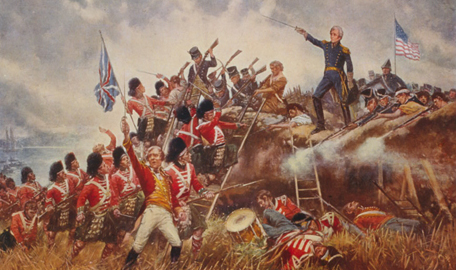In 1803, war between France and Britain erupted. They tried to destroy each other by trade (France's army was too strong for Britain to defeat France on land.) The U.S. was neutral. Both France and Britain would stoop American ships they thought to be headed for enemy ports. Some British seamen fled to American ships. Sometimes they not only took the Brisish soldiers back but also captured Americans Sailors.
In 1807, the Chesapeake Affair nearly brought war. British warship, Leopard, suspected deserters were aboard the U.S.S. Chesapeake. They stopped the American ship and demanded the right to search the vessel. Captain refused British opened fire and killed over 20 men. The Chesapeake surrendered, and the British took four deserters three of which were Americans.
The Embargo Act, adopted by Congress, through Jefferson's urging, bannedd all American trad with the rest of the world, keeping American goods from Europe. This hurt America more than other countries. Finally, Congress replaced the Embargo Act with the Non-Intercourse Act which resotred international trade but not with France or Britain. This was replaced with Macon's Bill Number Two which abolished the non-intercourse policy and restored all trade.
On June 1, 1812, Madison gave five reason for going to war with Britian: impressment of American sailors, violations of American territorial waters, plunderings of American goods, refusal to revoke trade restrictions, and incitement of the Indians to violence. Some favored the war while others were against the war.
The entire Northwest opened up to the British and Indians. Geral Hull was to attack Canada from Detroit. General Rensselaer was to attack from New York. Isaac Brock caused the plan to fail by surrounding Hull and scared him into surrendering his force without he even a fight. He, then, attacked Rensselaer's force. Brock was killed, and the Americans were driven back to New York.
America only had 16 warships, and they were going up against the largest navy in the world. However, America had victories at sea. The U.S.S Constitution was nicknamed "Old Ironsides". When the British fired at it, the cannonballs would bounce off the sides. Although victories soon stopped, the early wins encouraged the Americans.
Willilam Henry Harrison was given command of operations in the Northwest. Harrison realized Lake Erie was the point needed to secure the territory. With that area secured, Harrison moved against the British army. On October 5, 1813, Harrison routed the British-Indian force, and Tecumseh, Indian chief and leader, was killed in The Battle of the Thames.
Britain had a three way plan to win the War. First, an army would separate New York and New England from the rest of the states. Second a force would attack and raid any major cities on the east coast. Finally another force would attack and capture New Orleans.
The results of the war was that both states just wanted to stop fighting. Conditions went back to what they were in 1812. However, America did profit from the war. The Northwest was open for settlement; America could settle back in a form of isolation. After all of this, America had a gigantic sense of national pride and honor.


No comments:
Post a Comment